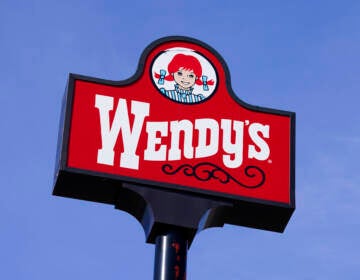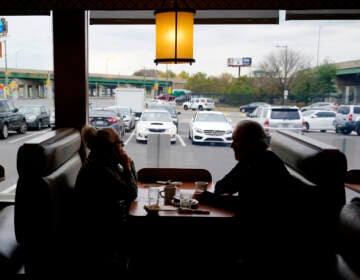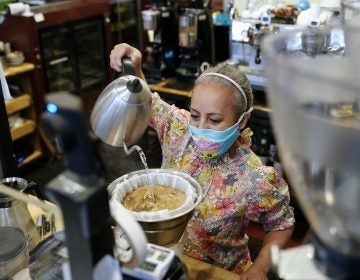What the return of indoor dining means in Philadelphia
Indoor dining is back. As many celebrate the return of restaurant life, workers face new conflicts and questions.
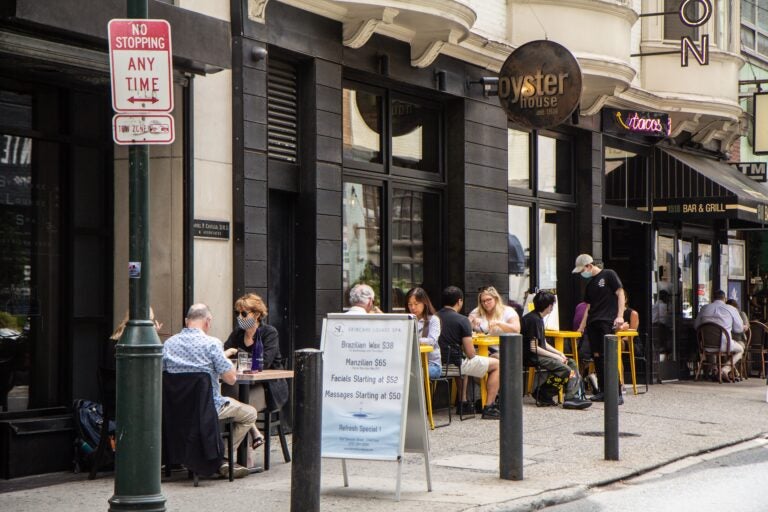
Outdoor dining in Philadelphia. (Kimberly Paynter/WHYY)
Are you on the front lines of the coronavirus? Help us report on the pandemic.
Philadelphia officials announced plans to resume limited indoor dining in the coming weeks –– news met with cheers by hard-hit restaurant and bar owners but met with skepticism from service industry employees.
Limited indoor dining has already begun elsewhere in Pennsylvania. City Health Commissioner Dr. Thomas Farley said that restaurants would be able to begin restricted indoor seating immediately after Labor Day, on Sept. 8, to avoid holiday crowds.
“We have made progress,” Farley said Thursday, of case totals in the city. “In hopes we have continued progress over the next two weeks, we will allow more activities that are permitted by the Commonwealth to resume.”
Bar service will remain off limits while dining will be limited to no more than four diners per table. Restaurants would be limited to no more than 25% capacity indoors, while an existing limit on gatherings of more than 25 persons in commercial buildings remains in effect. Alcohol will only be allowed for on-premises consumption with a meal, with last call fixed at 11 p.m.
Tables must be spaced at least six feet apart or have impermeable barriers separating patrons. Barriers will also be required in restaurant kitchens, at cash registers, host stands, and certain food pick-up areas.
Servers, meanwhile, will be required to wear masks and face shields, with employees screened for COVID-19 symptoms before every shift.
“The servers are the most at risk,” Farley said. “We will do this reopening very carefully.”
Limited indoor operations of movie theaters, bowling alleys, and performing arts venues will also resume. Mayor Jim Kenney pleaded with owners and residents to follow the new rules.
“I hope this change on Sept. 8 marks a turning point and everyone follows the restrictions,” he said. “I urge restaurant owners, employees, and patrons, let’s not push the envelope.”

Subscribe to PlanPhilly
Servers ‘most at risk’
Existing health concerns and decreased tips due to COVID-19 –– along with longstanding workplace issues in the restaurant business –– have already sparked employee strikes, protests, and organizing among local waitstaff laboring during the partial reopening. News that Philadelphia would move ahead with plans for indoor dining was met with mixed reactions among waitstaff.
Bartender Ashley Kane was laid off from her job at a Center City watering hole five months ago after seven years. Kane said she wants to go back to work but was concerned about putting herself at risk of contracting the virus while also earning significantly less due to capacity restrictions.
“I feel conflicted. Our positions put us in unhealthy positions, frequently,” she said. “And all these reports say being inside is the worst thing you can do.”
Experts have found that poorly ventilated indoor spaces where groups congregated to talk, sing or laugh in close proximity — like bars and restaurants — build up concentrations of microscopic viruses at alarmingly high rates.
Kane said she was unsure that proprietors would be willing or able to enforce the city’s regulations. While she said she believed it was worth experimenting with safely resuming indoor dining, her greatest fear was that doing so too hastily would lead to more spikes in cases, risking another total shutdown of restaurants and bars as a result.
“Most bars, their entire business plan is how many people can they cram in the door,” she said.
City vows to ramp up enforcement
Some local restaurateurs, like Marc Vetri, have called on the city to speed resumption of indoor dining, criticizing the city for repeatedly canceling earlier reopening dates.
“There is risk in everything we do,” Vetri argued. “We don’t shut down highways because there is a high risk of traffic accidents and deaths. We use common sense, create laws, limit speed, follow traffic lights, all to prevent incidents.”
But other owners were skeptical about the city’s plans.
“I think it’s sort of playing with fire,” Zach Morris, owner of Bloomsday Cafe, told the Inquirer this week. “You can’t contact-trace everybody. You can’t have everybody come in and sign a waiver.”
While officials like Farley pledged to ramp up enforcement, some restaurant workers that were already on the frontlines said they did not believe restaurants could safely resume indoor dining at all.
One Philadelphia service industry employee, who asked to be identified only as “Phil” out of fear of termination, said the city had failed to adequately enforce the strictures around the limited resumption of outdoor dining. After being recalled to his workplace, the server, who suffers from a chronic respiratory ailment, said he routinely observed owners allowing unsafe or unsanitary conditions to persist unchecked — but had little choice but to endure the risk.
“I can’t quit my job but I also don’t want to work for people that are so lackadaisical about this. I don’t feel safe at all,” he said. “We can say we’re doing all these things, but there’s no enforcement.”
The employee said he believes restaurants ought to have remained closed, with owners and employees compensated by the government until the pandemic subsides. He said concerned patrons should devote the money they would spend dining out to relief funds for service industry employees, like Philly’s Virtual Tip Jar.
“It doesn’t matter if you tip 20 or 30%. You need to stay home and let these businesses sort it out. Because they dont give a f–k about us,” said the server, who is now seeking work outside the hospitality industry.
Kane said she was on the cusp of being recalled to work, said she thought there was a misconception by owners that staff were trying to avoid work to stay on unemployment. But she said people in her position had credible health concerns as nearly all of her colleagues in the industry were uninsured or underinsured.
“A lot of owners and higher-ups think we’re just trying to stay home longer,” she said. “A lot of people are just really scared.”
WHYY is your source for fact-based, in-depth journalism and information. As a nonprofit organization, we rely on financial support from readers like you. Please give today.



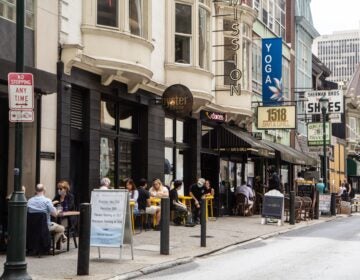

![CoronavirusPandemic_1024x512[1]](https://whyy.org/wp-content/uploads/2020/03/CoronavirusPandemic_1024x5121-300x150.jpg)
